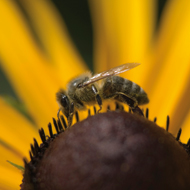
Researchers call for habitat protection strategy
Europe has a shortfall of 13.4 million honeybee colonies to properly pollinate its crops, research by the University of Reading has found.
Scientists at the University's Centre for Agri-Environmental Research (CAER), said demand for insect pollination is growing five times as fast as the number of honeybee colonies across Europe as farmers grow more oil crops, such as oilseed rape and sunflowers, and fruit.
The research, led by Prof Simon Potts, compared the numbers of active beehives with the demand for pollination across 41 European countries, and mapped the changes between 2005 and 2010.
They found that in more than half of European countries – including the UK, France, Germany and Italy – there were not enough honeybees to properly pollinate the crops grown.
Britain has only a quarter of the honeybees it needs. Only Moldova ,which is one of Europe's poorest countries with an economy more than 300 times smaller than Britain's – has a bigger honeybee deficit than the UK.
As a whole, Europe has only two thirds of the honeybee colonies it needs.
The findings suggest that agriculture in many countries is increasingly reliant upon wild pollinators, such as bumblebees, solitary bees and hoverflies but the researchers say Europe still lacks coherent environmental and agricultural policies to protect the habitats of these insects.
Dr Tom Breeze, who conducted the research published in the journal PLOS One, said: "This study has shown that EU biofuel policy has had an unforeseen consequence in making us more reliant upon wild pollinators.
"The results don't show that wild pollinators actually do all the work, but they do show we have less security if their populations should collapse."
This follows other research from the University of Reading, published last month in Biological Conservation, showing that wild pollinators such as bumblebees and solitary bees are just as effective pollinators of oilseed rape as honeybees.
Prof Potts said: "We face a catastrophe in future years unless we act now. Wild pollinators need greater protection.
"They are the unsung heroes of the countryside, providing a critical link in the food chain for humans and doing work for free that would otherwise cost British farmers £1.8 billion to replace.
"There is a growing disconnection between agricultural and environmental policies across Europe. Farmers are encouraged to grow oil crops, yet there is not enough joined-up thinking about how to help the insects that will pollinate them.
"We need a proper strategy across Europe to conserve wild bees and pollinators through habitat protection, agricultural policy and farming methods - or we risk big financial losses to the farming sector and a potential food security crisis."
The team also highlighted the economic impacts of pollination services to the British apple industry in a third study.
Insect pollinators add £37 million a year to the value of just two varieties of British apples, Gala and Cox, by increasing fruit yield and quality, research led by Dr Mike Garratt found.



 The Veterinary Medicines Directorate (VMD) is inviting applications from veterinary students to attend a one-week extramural studies (EMS) placement in July 2026.
The Veterinary Medicines Directorate (VMD) is inviting applications from veterinary students to attend a one-week extramural studies (EMS) placement in July 2026.